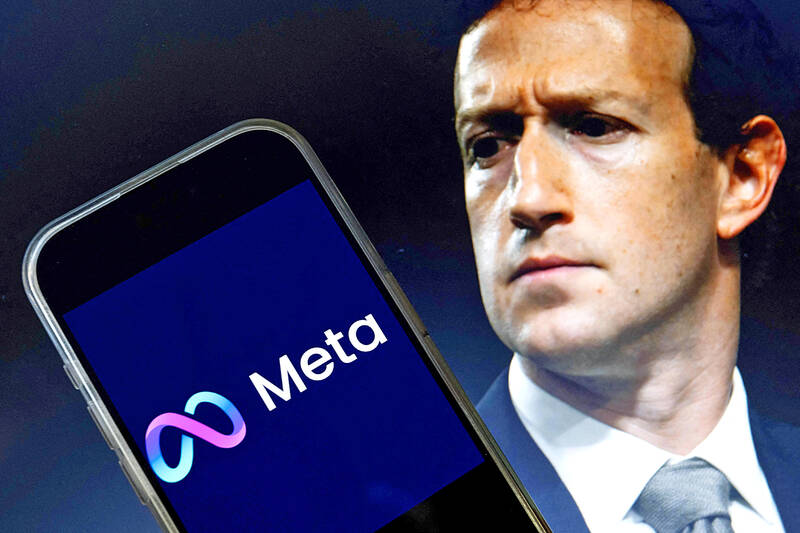Meta chief executive officer Mark Zuckerberg on Friday said the tech giant plans to invest at least US$60 billion in artificial intelligence (AI) this year, aiming to lead in the technology.
“This will be a defining year for AI,” Zuckerberg wrote on Facebook.
Zuckerberg expects Meta AI to be the top digital assistant, used by more than a billion people, and for the tech firm’s Llama 4 to be at the forefront of AI models, he wrote.

Photo: AFP
Meta is creating an AI “engineer” to contribute computer coding to its research and development efforts, he added.
Meta would construct a massive new datacenter to power its AI ambitions and is planning US$60 billion to US$65 billion in capital expenditures this year related to the technology, Zuckerberg said.
“This is a massive effort, and over the coming years it will drive our core products and business, unlock historic innovation and extend American technology leadership,” he said.
The announcement comes just days after US President Donald Trump announced a major investment to build infrastructure for AI led by Japanese giant Softbank and ChatGPT maker OpenAI.
Trump said the venture, called Stargate, “will invest US$500 billion, at least, in AI infrastructure in the United States.”
However, in a post on his social media platform X, Trump ally and tech tycoon Elon Musk said the main investors “don’t actually have the money.”
The comment marked a rare instance of a split between the world’s richest man and Trump, with Musk playing a key role in the newly installed administration after spending US$270 million on the election campaign.
Meanwhile, Microsoft president Brad Smith has gone on record saying the company was on pace this fiscal year to invest about US$80 billion to build out AI datacenters, train AI models and deploy cloud-based applications around the world.
“The United States is poised to stand at the forefront of this new technology wave, especially if it doubles down on its strengths and effectively partners internationally,” Smith wrote online.

Intel Corp chief executive officer Lip-Bu Tan (陳立武) is expected to meet with Taiwanese suppliers next month in conjunction with the opening of the Computex Taipei trade show, supply chain sources said on Monday. The visit, the first for Tan to Taiwan since assuming his new post last month, would be aimed at enhancing Intel’s ties with suppliers in Taiwan as he attempts to help turn around the struggling US chipmaker, the sources said. Tan is to hold a banquet to celebrate Intel’s 40-year presence in Taiwan before Computex opens on May 20 and invite dozens of Taiwanese suppliers to exchange views

Application-specific integrated circuit designer Faraday Technology Corp (智原) yesterday said that although revenue this quarter would decline 30 percent from last quarter, it retained its full-year forecast of revenue growth of 100 percent. The company attributed the quarterly drop to a slowdown in customers’ production of chips using Faraday’s advanced packaging technology. The company is still confident about its revenue growth this year, given its strong “design-win” — or the projects it won to help customers design their chips, Faraday president Steve Wang (王國雍) told an online earnings conference. “The design-win this year is better than we expected. We believe we will win

Chizuko Kimura has become the first female sushi chef in the world to win a Michelin star, fulfilling a promise she made to her dying husband to continue his legacy. The 54-year-old Japanese chef regained the Michelin star her late husband, Shunei Kimura, won three years ago for their Sushi Shunei restaurant in Paris. For Shunei Kimura, the star was a dream come true. However, the joy was short-lived. He died from cancer just three months later in June 2022. He was 65. The following year, the restaurant in the heart of Montmartre lost its star rating. Chizuko Kimura insisted that the new star is still down

While China’s leaders use their economic and political might to fight US President Donald Trump’s trade war “to the end,” its army of social media soldiers are embarking on a more humorous campaign online. Trump’s tariff blitz has seen Washington and Beijing impose eye-watering duties on imports from the other, fanning a standoff between the economic superpowers that has sparked global recession fears and sent markets into a tailspin. Trump says his policy is a response to years of being “ripped off” by other countries and aims to bring manufacturing to the US, forcing companies to employ US workers. However, China’s online warriors